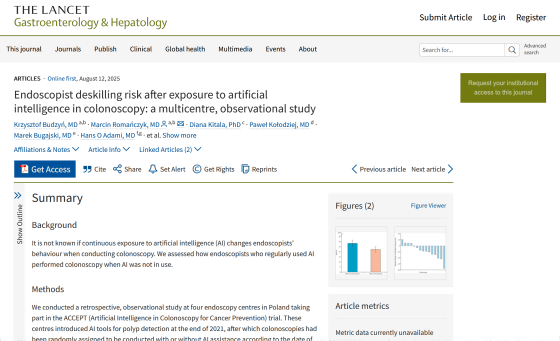The introduction of medical AI tools could diminish the skills of experienced doctors in just a few months

AI tools have been introduced in various fields in recent years, and medical AI tools used to detect cancer tumors and other conditions are particularly promising for the benefits they offer to both patients and doctors. However, a new paper published in the medical journal The Lancet Gastroenterology and Hepatology reports that the introduction of medical AI tools into endoscopy may reduce the skills of experienced doctors within just a few months.
Endoscopist dekilling risk after exposure to artificial intelligence in colonoscopy: a multicentre, observational study - The Lancet Gastroenterology & Hepatology

The Lancet Gastroenterology & Hepatology: Routine AI assistance may lead to loss of skills in health professionals who perform colonoscopies, study suggests | EurekAlert!
https://www.eurekalert.org/news-releases/1094223
AI Eroded Doctors' Ability to Spot Cancer Within Months in Study - Bloomberg
https://www.bloomberg.com/news/articles/2025-08-12/ai-eroded-doctors-ability-to-spot-cancer-within-months-in-study
Colonoscopy is a test in which an endoscope is inserted into the large intestine to visually diagnose cancer and adenomas , which are precursors to cancer. Many studies have shown that using AI tools in colonoscopy can increase the detection rate of adenomas, but the impact of introducing AI tools on physician skills was not well understood.
Therefore, a research team from Poland and Norway analyzed colonoscopies performed at four colonoscopy centers in Poland between September 2021 and March 2022. At these centers, examinations using AI tools have been regularly conducted since the end of 2021, and colonoscopies without AI tools have also been performed in parallel.
The research team compared 795 colonoscopies performed before the AI tool was introduced with 648 performed after the AI tool was introduced during the study period, and analyzed how the introduction of the AI tool affected the doctors' judgments. All colonoscopies analyzed were performed by 19 experienced endoscopists with over 2,000 colonoscopies under their belts.

The analysis revealed that the adenoma detection rate in colonoscopies performed by human physicians alone significantly decreased from 28.4% before the introduction of the AI tool to 22.4% after the introduction of the AI tool. This suggests a relative decrease of 20% in the adenoma detection rate by colonoscopy and a 6 percentage point decrease in absolute terms. In addition, in 734 colonoscopies performed using the AI tool, the adenoma detection rate was 25.3%.
Professor
Dr. Omar Ahmad of University College London, who was not involved in the study, commented, 'These findings call for a damper on the current enthusiasm for the adoption of AI technology... and highlight the importance of carefully considering potential unintended clinical impacts.' 'AI still holds great potential for improving clinical outcomes, but we need to protect against the risk of a gradual erosion of the fundamental skills required for high-quality endoscopy.'

Related Posts:
in Web Service, Science, Posted by log1h_ik







